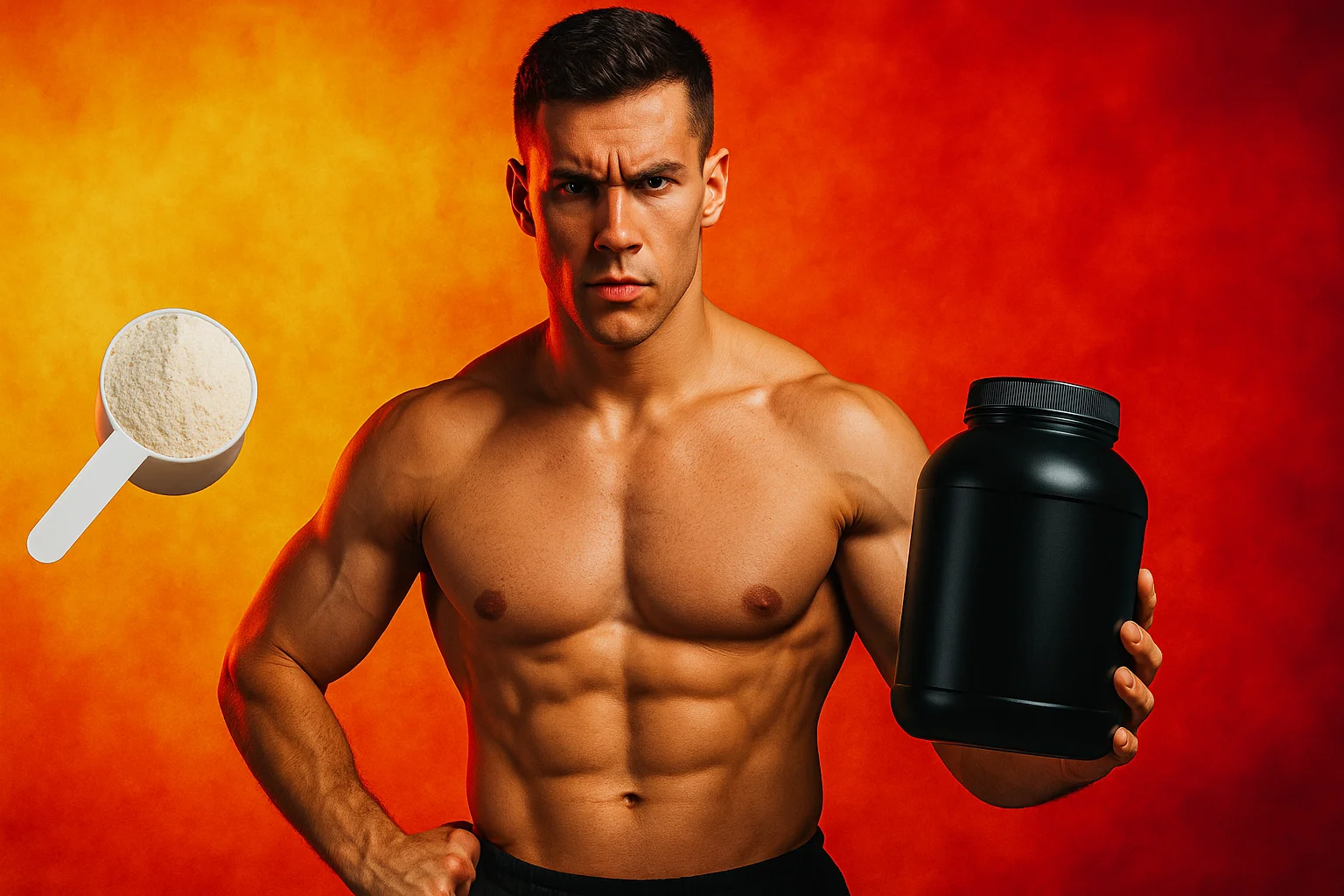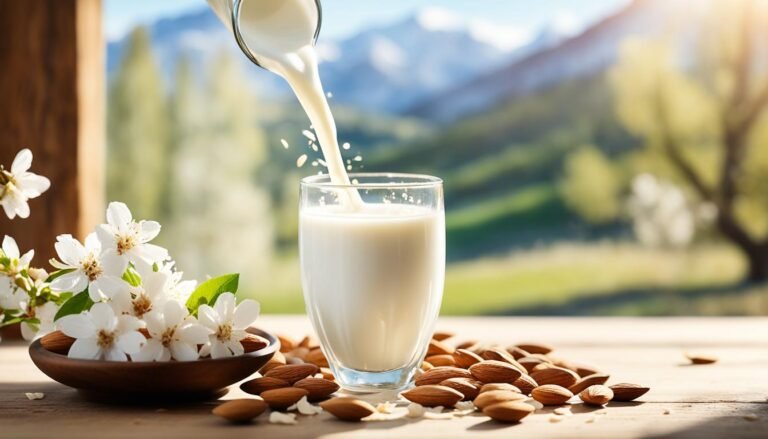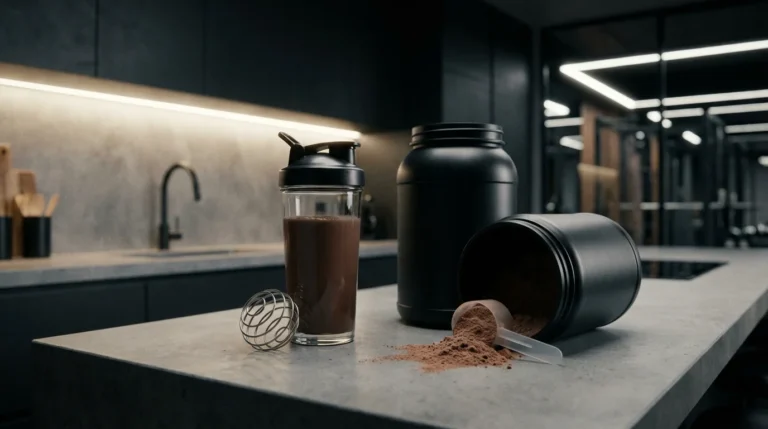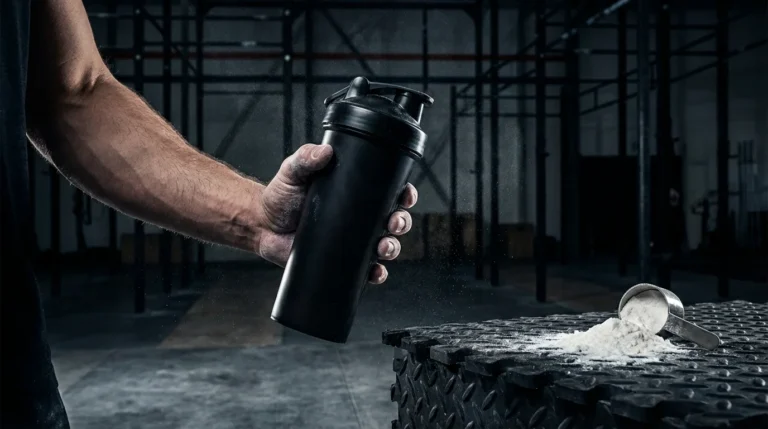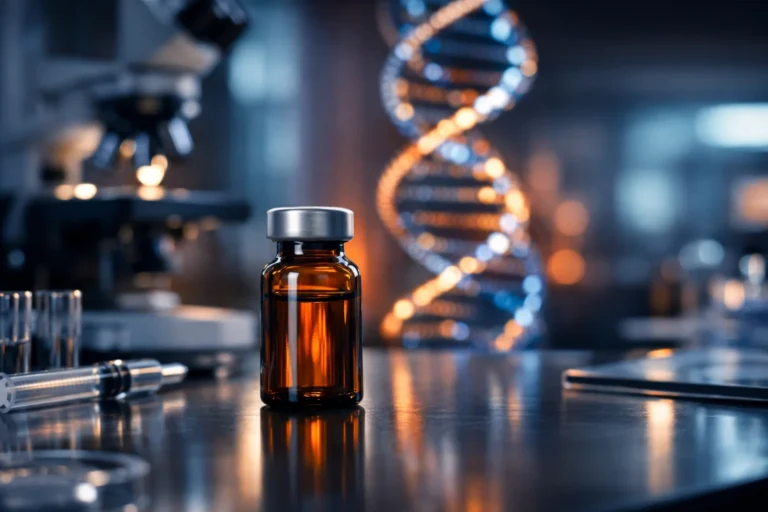More people are choosing dairy alternatives, leading to a question: is almond milk good for testosterone levels?
Testosterone is key for health and well-being. We’ll look into how almond milk affects this important hormone. We aim to give you the facts to help you choose what to eat.
Key Takeaways about Is Almond Milk Good For Testosterone
- Almond milk is a popular dairy alternative, but its impact on testosterone levels is not well-studied.
- Testosterone plays a vital role in male health, including sexual function, muscle development, and bone density.
- While some foods and lifestyle factors can affect testosterone, the relationship between almond milk and testosterone is not conclusive.
- Maintaining a balanced diet and adopting healthy habits are essential for optimal testosterone levels.
- It is important to consult with a healthcare professional for personalized advice on managing testosterone levels.
Understanding Testosterone
Testosterone is a key hormone for men’s health and growth. It’s made in the testicles and helps with many important tasks. These include making muscles, bones, and sex drive, and keeping energy up.
Roles and Importance of Testosterone
During puberty, testosterone helps boys grow into men. It makes the voice deeper, hair grow, and muscles bigger. As men get older, it keeps their sex life healthy, helps make sperm, and keeps them feeling good.
It also helps with mood, thinking, and heart health. Having the right amount of testosterone is important for a man’s health.
Healthy Testosterone Levels
For adult men, testosterone levels should be between 264 ng/dL and 916 ng/dL. If levels are too low, it’s called hypogonadism. Things like age, weight, illness, medicines, stress, sleep, and diet can affect testosterone.
Keeping testosterone levels healthy is key for men’s health. Luckily, there are ways to help. Making healthy choices in your life and diet can support your testosterone.
Almond Milk – Nutritional Profile
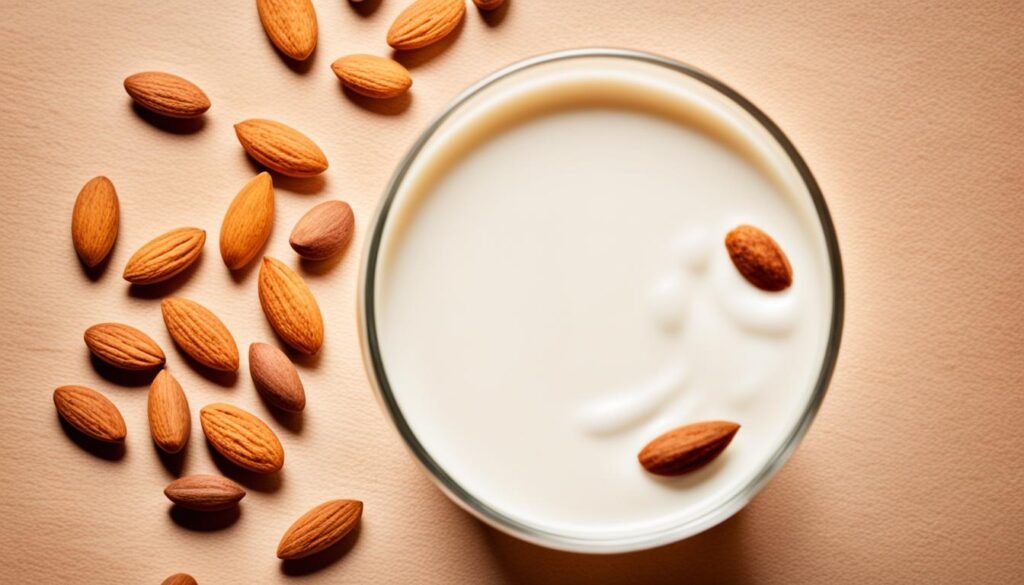
Almond milk is a popular dairy alternative known for its low calories and heart-healthy qualities. A glass of almond milk has about 30-40 calories, making it great for weight management. It’s much lower in saturated fat than cow’s milk, which is good for the heart.
Almond milk is also packed with vitamins and minerals. Many brands add calcium and vitamin D, which are key for strong bones and teeth. It’s also a good source of vitamin E, an antioxidant that protects cells from damage.
| Nutrient | Amount per Serving (1 cup) |
|---|---|
| Calories | 129 kcal |
| Fat | 11 g |
| Cholesterol | 0 mg |
| Carbohydrates | 4.2 g |
| Dietary Fiber | 2 g |
| Protein | 4.2 g |
| Sodium | 1 mg |
| Calcium | 52.8 mg |
| Iron | 0.8 mg |
| Potassium | 149 mg |
| Vitamin E | 3.3 mg |
| Magnesium | 54 mg |
Almond milk doesn’t have as much protein as cow’s milk, but it’s still a great choice for those looking for a low-calorie, dairy-free option. As more people choose non-dairy milk, almond milk is becoming a top choice. It offers many health benefits for those who are health-conscious.
Potential Impact of Almond Milk on Testosterone
Some people worry that almond milk might affect testosterone levels. This worry comes from phytoestrogens, which are plant compounds that act like estrogen in the body. But, almond milk has low levels of these compounds. They are unlikely to greatly affect hormone balance in healthy people.
Phytoestrogens and Hormone Balance
Phytoestrogens are in many plant-based foods like soy, flaxseeds, and almonds. They can affect the body’s estrogen receptors. Yet, studies show that the amounts in a balanced diet don’t cause big changes in hormone levels.
Some studies even suggest that eating almonds can be good for health, including the heart. This is because almonds have healthy fats, fiber, and antioxidants.
It’s key to remember that how people react to food can differ. Always talk to a healthcare professional or dietitian before changing your diet, especially if you have health issues.
| Nutrient | Almond Milk (1 cup) | Cow’s Milk (1 cup) |
|---|---|---|
| Calories | 30-40 calories | 148 calories |
| Protein | 1-2 grams | 8 grams |
| Fat | 2.5 grams | 7.9 grams |
| Carbohydrates | 1-2 grams | 12 grams |
Almond milk has fewer calories, fat, and carbs than cow’s milk. It’s good for those watching their weight or eating fewer calories. But, it has less protein, so getting enough protein from other sources is important.
In conclusion, while almond milk contains phytoestrogens, the science says it won’t greatly affect testosterone levels in healthy people. Always talk to a healthcare professional or dietitian before changing your diet to make sure you’re getting what you need.
Dietary Considerations for Testosterone

Keeping testosterone levels healthy is more than just avoiding some foods. It’s about eating a balanced diet and living a healthy lifestyle. Important for testosterone support are eating enough protein from lean sources, adding healthy fats like those in avocados, nuts, and olive oil, and eating more fruits and vegetables.
A 2018 study found that eating a lot of bread, pastries, and desserts can lower testosterone in men. These foods led to less muscle and more body fat. Also, licorice root can cut down testosterone in women during their periods, as shown in a 2018 study.
On the other hand, polyunsaturated omega-3 fatty acids can make testicles bigger and work better, says a 2017 study. But, trans fats and too much omega-6 fatty acids can lower testosterone and harm testicular function.
It’s also key to eat fewer processed foods and drink less alcohol. These can hurt testosterone levels. Eating foods like fresh fruit and whole grains can help with hormone production.
By choosing foods wisely and eating a balanced diet, people can keep their testosterone levels in check. This supports overall health and well-being.
“A diet high in processed foods, sugar, and unhealthy fats can have a detrimental impact on testosterone levels. Incorporating more whole, nutrient-dense foods is key for maintaining hormonal balance.”
is almond milk good for testosterone
Vitamin D and Testosterone Levels
Almond milk doesn’t directly affect testosterone levels, but it has vitamin D. Vitamin D is key for making testosterone. This hormone is important for a healthy body, sex drive, and overall health.
Almond milk is packed with vitamin D, giving you 25% of what you need daily. Regular dairy milk only gives 15%. Studies show that vitamin D supplements can boost testosterone in men. So, almond milk’s vitamin D might help keep testosterone levels healthy, especially for those lacking this nutrient.
Even though almond milk’s vitamin D could be beneficial, its effect on testosterone is still being studied. Other factors like zinc intake and diet also affect testosterone levels.
Other Foods That May Affect Testosterone
Almond milk isn’t the only food that can change testosterone levels in men. Many foods, like herbs, spices, fats, and drinks, can also affect testosterone. Some foods directly change hormone levels, while others impact metabolism indirectly.
Mint and Licorice Root
Mint, especially spearmint and peppermint, might lower testosterone levels. A study with 42 women showed a big drop in testosterone after drinking peppermint tea for 30 days. Also, eating licorice root can cut testosterone levels by 26% in men.
Flaxseed and Trans Fats
Flaxseed, rich in lignans that bind to testosterone, can lower testosterone levels. Also, trans fats in processed foods can reduce testosterone by 15%, as one study found.
Alcohol and Sugar
Drinking too much alcohol can greatly lower testosterone levels. A study found that 30-40 grams of alcohol daily cut testosterone by 6.8% in three weeks. Too much sugar also leads to a 25% drop in testosterone levels.
Beneficial Foods for Testosterone
- Spinach is packed with magnesium, key for muscle growth and reproductive health in men.
- Oysters are full of zinc, which boosts testosterone and helps muscles grow.
- Garlic and onions help release hormones that increase testosterone production.
- Brazil nuts give selenium, which helps improve sperm motility when testosterone is low.
- Broccoli helps testosterone by reducing too much estrogen.
- Eggs have cholesterol and aspartic acid needed for making testosterone.
- Fatty fish and tuna with omega-3s and vitamin D support sperm health and testosterone.
- Bananas and avocados have nutrients that might raise testosterone levels.
- Red meat is full of zinc and saturated fat, good for testosterone.
- Beans are high in protein and zinc, helping make testosterone.
- Pumpkin seeds are a great source of zinc for testosterone production.
- Coconut has saturated fat that helps make testosterone.
While some foods can lower testosterone, many whole foods can help keep it healthy. Eating a balanced diet rich in nutrients is key for good testosterone levels and men’s health.
Boosting Testosterone Levels
Keeping testosterone levels healthy is key for men’s health. Supplements can raise hormone levels, but diet and lifestyle changes help too. By eating certain foods and living healthily, men can boost their testosterone naturally. This can improve their health in many ways.
Testosterone Supplements
For men with low testosterone, supplements are a common choice. They increase testosterone levels right away. But, it’s important to talk to a doctor before starting any supplements to make sure they’re safe and work well.
Diet and Lifestyle Changes
Changing what you eat and how you live can also help keep testosterone levels up. Foods full of magnesium, zinc, and vitamin D help make testosterone. Exercise, managing stress, and getting enough sleep are also key.
- Eat foods high in magnesium like leafy greens, nuts, and seeds to help make testosterone.
- Do regular exercise, including weight training, to naturally increase testosterone.
- Get good sleep, as not sleeping well can lower testosterone levels.
- Use relaxation methods to handle stress, as too much stress can lower testosterone.
By eating right and living well, men can help support their testosterone levels and health.
“Proper nutrition, sufficient sleep, and regular exercise are key to maintaining healthy testosterone levels.”
| Nutrient | Food Sources | Potential Impact on Testosterone |
|---|---|---|
| Vitamin D | Tuna, egg yolks, fortified milk | Can boost testosterone levels by up to 90% |
| Zinc | Almonds, oysters, red meat | Not having enough zinc can lower testosterone levels |
| Magnesium | Spinach, pumpkin seeds, whole grains | Linked to higher testosterone levels |
Symptoms of Low Testosterone
Low testosterone, or hypogonadism, shows different symptoms at different ages. It’s important to know these signs for early detection and treatment.
Before Birth
Before birth, low testosterone can affect the growth of sex organs. This might lead to underdeveloped male genitalia or even female genitals. This condition is called hypogonadism and can affect a person’s life if not managed well.
During Puberty
During puberty, low testosterone can slow down the growth of secondary sex characteristics. This includes muscle growth, facial hair, and fertility. If a teenager doesn’t go through puberty normally, it could mean they have low testosterone.
In Adulthood
In adults, low testosterone can cause a drop in sex drive, energy, and mood. It can also lead to less masculine features and osteoporosis. About 40 percent of men over 45 have low testosterone.
Knowing the signs of low testosterone at each life stage is key for staying healthy. Catching it early and treating it can lessen the bad effects of hypogonadism.
Importance of Maintaining Healthy Testosterone
Keeping testosterone levels right is key for good male health and wellbeing. This hormone helps build and keep up muscle mass, bone density, libido, and energy levels. If testosterone levels drop, it can cause obesity, metabolic syndrome, type 2 diabetes, heart disease, and osteoporosis.
It’s important to keep healthy testosterone levels for good health. Testosterone helps with many body functions. Keeping it in balance is key for men’s wellbeing. By supporting testosterone, you can get better muscle mass, bone density, libido, and energy levels.
“Optimizing testosterone levels is not just about muscle-building or sexual function – it’s about maintaining overall male health and ensuring that the body functions at its best.”
Regular check-ups, eating well with testosterone-boosting foods, and living a healthy life help keep testosterone levels right. By focusing on male health and supporting testosterone production, you can live better and lower health risks.
In short, having healthy testosterone levels is key for male health and wellbeing. Knowing how important testosterone is and supporting its production helps you perform better physically and mentally. It also helps with muscle mass, bone density, libido, and energy levels.
Myths and Misconceptions
There are many myths and misconceptions about foods and testosterone levels. One common belief is that soy products like tofu and soy milk can lower testosterone in men. But, recent studies have shown this is not true. Soy does not significantly affect testosterone levels.
Another myth is that dairy products harm testosterone. Some studies have hinted at a link, but the evidence is not strong. It’s important to trust scientific research when looking at how diet affects testosterone.
| Myth | Fact |
|---|---|
| Soy products lower testosterone | Recent studies have found no significant effect of soy consumption on testosterone levels in men. |
| Dairy products negatively impact testosterone | The relationship between dairy consumption and testosterone levels is not well-established by current research. |
It’s key to know the truth about foods and testosterone. By understanding the facts, people can make better food choices. This helps support their health and well-being.
Conclusion
Almond milk is unlikely to greatly affect testosterone levels in healthy people. It’s part of a bigger picture that includes diet and lifestyle. Eating enough protein, healthy fats, fruits, and veggies is key. Also, eating less processed food and drinking less alcohol helps.
If you’re worried about your testosterone levels, talk to a healthcare expert. They can give you advice that fits your needs and check for any health issues. A balanced diet and lifestyle changes can help keep your hormones in check. You don’t have to cut out almond milk from your diet.
Keeping testosterone levels healthy requires a full approach. This means looking at your diet, exercise, stress, and health conditions. Almond milk can be part of a healthy diet when eaten in moderation. It’s not a single fix, but it can help when part of a balanced diet.
Frequently Asked Questions
Does almond milk affect testosterone levels?
Most studies indicate that almond milk does not have a significant impact on hormone balance, including testosterone levels, in healthy individuals. While some worry about this, the evidence suggests it's not a major concern.
What is the primary role of testosterone?
Testosterone is a vital hormone for male growth and overall health. It plays a key role in developing and maintaining muscle mass, bone density, mood, energy levels, and sex drive. Maintaining healthy testosterone levels is crucial for general well-being.
What are considered healthy testosterone levels?
Normal testosterone levels typically fall within the range of 264 ng/dL to 916 ng/dL in adult males. Levels below this range may be considered low, a condition known as hypogonadism.
Do phytoestrogens in almond milk impact hormone balance?
Some concern exists regarding phytoestrogens in almond milk and their potential effect on testosterone. However, the amount of phytoestrogens in almond milk is generally small and is unlikely to significantly alter hormone balance in healthy people.
Can vitamin D found in almond milk help testosterone?
Yes, vitamin D, which is often used to fortify almond milk, might positively influence testosterone levels. Research suggests that higher levels of vitamin D can correlate with increased testosterone levels.
Besides almond milk, what other foods can affect testosterone?
Certain foods like mint, licorice root, flaxseed, and some types of nuts may have an effect on testosterone levels. These foods can contain compounds that either directly or indirectly influence hormone balance.
How can I naturally boost my testosterone levels?
To potentially boost testosterone naturally, consider dietary adjustments like eating leafy greens and nuts, incorporating supplements (as advised by a professional), engaging in regular exercise, and ensuring you get sufficient sleep. Avoiding processed foods and reducing alcohol intake can also be beneficial.
